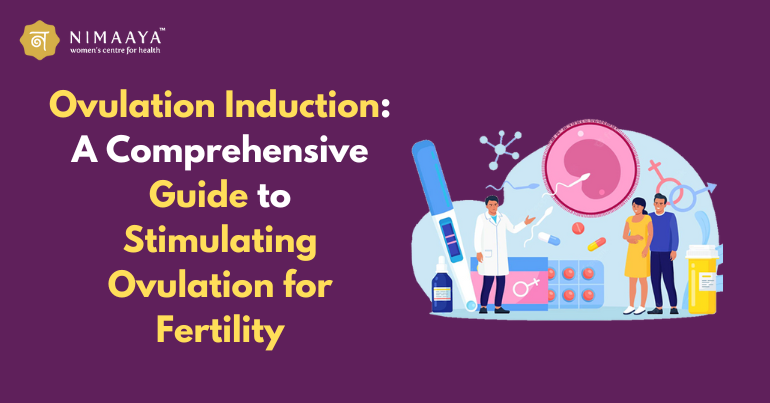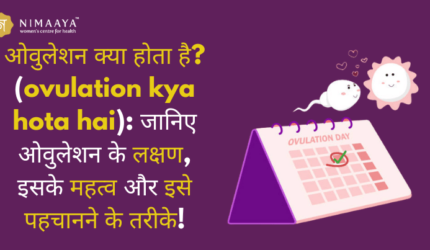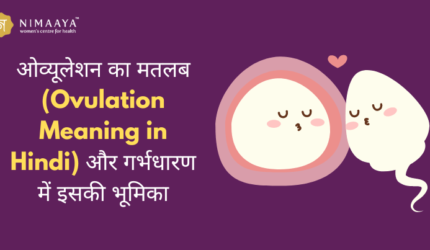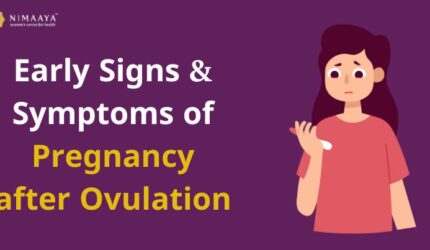In India, Ovulation induction cases account for 25% of female infertility. The journey of infertility for couples can be mentally and emotionally challenging.
To overcome this, couples often consult IVF specialists like Nimaaya and other IVF fertility centers. They undergo various tests and provide their fertility and genetics history, as well as semen analysis. Based on these results, the specialists determine the best time for intercourse as part of the ovulation stimulation treatment.
In this blog, we will be understanding ovulation induction, including the process, its purpose, medication, and considerations for couples and individuals seeking to enhance fertility.
Let’s get started!
What is Ovulation Induction?
For a layman, ovulation induction involves the use of hormonal therapy to stimulate the development and release of eggs or ovulation. These drugs are designed to induce ovulation in women who do not ovulate naturally or have irregular menstrual cycles.
Ovulation induction drugs are often suggested to be taken at the beginning of the menstrual cycle, and the body’s response is monitored throughout the cycle using ultrasound.
Finally, the IVF specialist determines the optimal time for ovulation and, therefore, the best time for intercourse. The ultimate goal of the ovulation is to produce a single, healthy egg.
It can also help increase the number of eggs reaching maturity in a single cycle, thereby increasing the chances of conception.
The comprehensive process of Ovulation Induction
-
Performing initial evaluation
The initial evaluation starts with determining the reason behind infertility or ovulation disorders. In this, different tests are conducted, including assessing the patient’s medical history, hormonal levels, and reproductive health.
-
Starting with the medical regimen
Following the evaluation, the next step is to perform the evaluation test. The dosage and specific ovulation drugs are tailored to the individual.
-
Monitoring induction
After starting the medication, close monitoring is essential. This step involves regular ultrasound scans and assessment of hormonal levels. These tests allow healthcare providers to track the development of ovarian follicles and the maturation of eggs.
-
Triggering ovulation
When the ovarian follicle has reached a certain stage and the appropriate size, the patient receives a hormone injection called hCG to trigger ovulation. This ensures the release of mature eggs from the ovaries.
-
Timing fertilization
After administering the ovulation induction injection, the timing of sexual intercourse or assisted reproductive procedure, such as IVF or ICSI, should be considered. To maximize the chances of pregnancy, it is suggested that fertilization occurs within a specific period.
Risks in Ovulation Induction
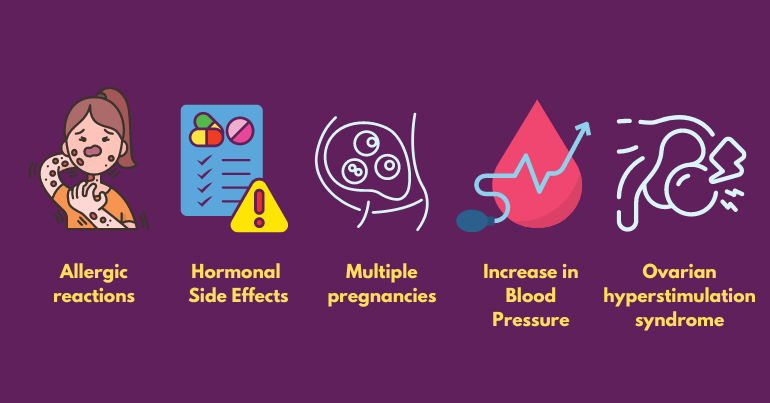
There are various risks of ovulation induction which involve the use of certain hormone medications that are prone to some side effects. But, they eventually recover within time without the intervention of any medical treatment. Moreover, we will also learn about ovulation induction side effects. Let’s get started:
-
Allergic reactions
Some patients may be allergic to the fertility medication used during induction. Allergic reactions may include itchiness, swelling, rashes, and shortness of breath. If a patient experiences any of these reactions, it is essential to consult an IVF specialist immediately.
-
Hormonal side effects
Medications used for ovulation can lead to hormonal fluctuations, causing side effects such as mood swings, headaches, and irritability. Its important to note that these side effects are typically short-term and manageable.
-
Multiple pregnancies
Stimulating the ovaries to produce multiple eggs increases the risk of multiple pregnancies. Multiple pregnancies can have health implications for both the mother and the babies and are less desirable.
-
Ovarian hyperstimulation syndrome (OHSS)
Excessive response to fertility medications used in ovulation induction can result in OHSS, which means that it becomes overstimulated. This condition involves overstimulation of the ovaries and is associated with symptoms like vomiting, dizziness upset stomach, and much more. OHSS causes the ovaries to enlarge, and fluid may accumulate in the abdomen during this time.
Who can opt for ovulation induction?
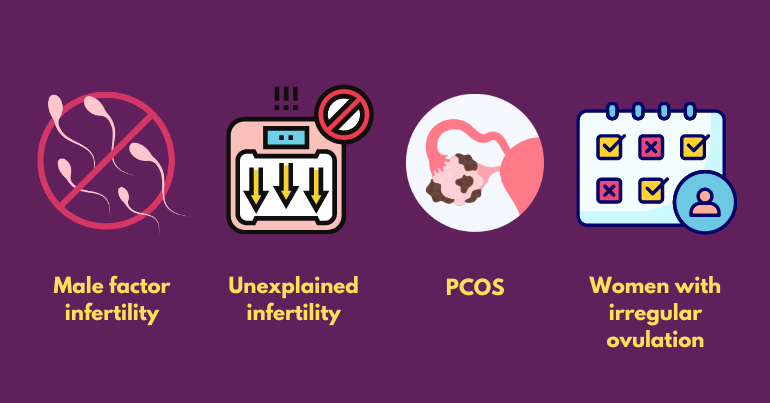
-
Male factor infertility
It is when a male has low sperm count, sperm abnormalities like poor motility and abnormal morphology, or blockage that is preventing the delivery of sperm. Here, couples may benefit from ovulation induction in conjunction with ICSI or IMSI procedures.
-
Unexplained infertility
It is when fertility testing fails to explain the reasons for infertility. In such cases, unexplained fertility is majorly concerned with factors such as blockage of the fallopian tube, chromosome abnormalities, poor sperm count, or health conditions.
-
PCOS
Women with PCOS have an excess of male hormones, which indirectly affects their menstrual cycles and ovulation.
-
Women with irregular or absent ovulation
Women experiencing irregular or absolute absence of periods can benefit from ovulation. This procedure involves the manipulation of certain hormones to stimulate ovulation.
Benefits of ovulation Induction
-
Increased chances of conception
Ovulation induction significantly contributes to increasing the chances of successful pregnancy by regulating and enhancing the ovulation process, particularly in patients facing fertility issues.
-
Controlling the timing
IVF specialists can recommend planned procedures with timed intercourse to maximize the chances of pregnancy. This approach is designed to ensure that couples get better chances of achieving pregnancy.
-
Better utilization of fertility treatment
Couples experiencing infertility issues have options for receiving treatment such as IVF, ICSI, and ovulation induction to address their concerns. These treatments offer a path to pregnancy with minimized risk and reduced chances of failure.
The success rate in ovulation induction
The ovulation induction success rate depends on various factors, including age, diagnosis, and specific health conditions. On average, approximately 20 to 25% of women achieve successful pregnancies through ovulation each year. This makes ovulation induction particularly effective for women with fertility issues or PCOS.
At Nimaaya IVF fertility center, our team of highly skilled IVF fertility specialists are experts in ovulation induction. With the help of advanced technology, we assist couples in their journey to achieve pregnancy.
Method of Ovulation Induction
There are two types of ovulation, mainly oral and injectable. No matter the method you choose, we at Nimaaya IVF Center make sure that there is proper treatment and the best services provided by us.
The process begins with an ultrasound performed approximately 3 days after commencing period. Once your period begins, you will have to wait for 3 to 5 days, and then only you can start your medication.
Oral medication for ovulation induction:
1) Clomiphene citrate
An oral medication that stimulates the production of follicle-stimulating hormone (FSH) and luteinizing hormone (LH). These hormones will stimulate the development of eggs in the ovaries and regulate ovulation.
2) Gonadotropins
An injectable medication that contains FSH and LH. Like clomiphene citrate, it stimulates the growth of eggs within the ovarian follicle and regulates their release during the ovulation cycle. It is suggested to avoid the medication because of its powerful properties that pose a risk of infertility in some cases.
3) Aromatase inhibitors
This medication, specifically letrozole, is preferred for women facing ovulation induction in PCOS. It is used for ovulation induction.
Also Read: What is PCOS? Does Everything Need to Know
4) Injectable medication
There are cases when ovulation induction drugs won’t work; injectable medication may be the best option. The FSH injection starts on day three of your period and continues for 10 days, stopping sooner if the follicle ripens quickly.
Consideration of individuals and couples to enhance fertility
When individuals and couples are considering ovulation as fertility treatment, there are important considerations to be kept in mind. It is a medical procedure that involves stimulating the ovaries to release eggs and is used to address ovulatory disorders to enhance fertility. Let’s explore a few key considerations:
-
Lifestyle choices
Lifestyle factors and ovulation induction such as a healthy diet, and exercise should be adopted and habits such as smoking, and drinking can impact the effectiveness of ovulation induction.
-
The underlying cause of infertility
It is often said that the cause of infertility is PCOS or irregular menstrual cycle. It is crucial to identify the underlying cause and determine the most suitable treatment.
-
Monitoring and follow-up
To track the progress of ovulation induction, it is essential monitoring ovulation induction through ultrasound and blood tests to track the progress of ovulation induction.
-
Emotional and psychological aspects
One who undergoes the treatment involves a lot of emotional investment of an individual. Start seeking emotional support through counseling, and session therapy that will definitely help you cope with it emotionally.
-
Financial aspect
Couples who opt for infertility treatment always believe that there will be a major financial impact if they go for one. But this is a myth, Nimaaya makes sure that the infertility treatment and ovulation induction cost is an effective treatment for all.
Testing for pregnancy
In case of ovulation induction, you can take the pregnancy test at home. The other option is going for a detailed check of HCG hormone in your urine. Once you conceive, your body will produce HCG. It is also possible that you get a positive result on the first day of your cycle, then it will be almost two weeks since your conception.
Why Nimaaya, IVF center for treatment of ovulation induction?
With 30 years of experience, Nimaaya IVF Center specializes in providing infertility treatment to couples. We offer personalized consultation to understand the specific challenges couples face when trying to conceive a baby. Our top-notch, state-of-the-art facility is dedicated to providing individualized care, ultimately leading to the best possible fertility outcome on your fertility journey.
Consult with us today!

